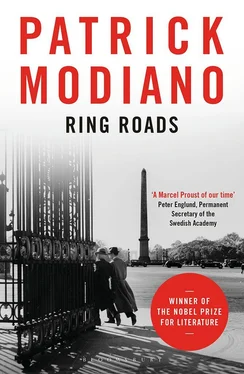Patrick Modiano - Ring Roads
Здесь есть возможность читать онлайн «Patrick Modiano - Ring Roads» весь текст электронной книги совершенно бесплатно (целиком полную версию без сокращений). В некоторых случаях можно слушать аудио, скачать через торрент в формате fb2 и присутствует краткое содержание. Год выпуска: 2015, Издательство: Bloomsbury Paperbacks, Жанр: Современная проза, на английском языке. Описание произведения, (предисловие) а так же отзывы посетителей доступны на портале библиотеки ЛибКат.
- Название:Ring Roads
- Автор:
- Издательство:Bloomsbury Paperbacks
- Жанр:
- Год:2015
- ISBN:нет данных
- Рейтинг книги:3 / 5. Голосов: 1
-
Избранное:Добавить в избранное
- Отзывы:
-
Ваша оценка:
- 60
- 1
- 2
- 3
- 4
- 5
Ring Roads: краткое содержание, описание и аннотация
Предлагаем к чтению аннотацию, описание, краткое содержание или предисловие (зависит от того, что написал сам автор книги «Ring Roads»). Если вы не нашли необходимую информацию о книге — напишите в комментариях, мы постараемся отыскать её.
The Night Watch
Ring Roads — читать онлайн бесплатно полную книгу (весь текст) целиком
Ниже представлен текст книги, разбитый по страницам. Система сохранения места последней прочитанной страницы, позволяет с удобством читать онлайн бесплатно книгу «Ring Roads», без необходимости каждый раз заново искать на чём Вы остановились. Поставьте закладку, и сможете в любой момент перейти на страницу, на которой закончили чтение.
Интервал:
Закладка:
Maud Gallas . I don’t have much information on her. She tried her hand as a singer — short-lived. Marcheret told me she had managed a nightclub near the Plaine Monceau that catered exclusively to female clients. Murraille even claimed that having been charged with receiving stolen goods, she had become persona non grata in Département de la Seine . One of her friends had bought the Clos-Foucré from the Beausires and, thanks to her wealthy patron, she now managed the auberge .
Annie Murraille was twenty-two. A diaphanous blonde. Was she really Jean Murraille’s niece? This was something I was never able to confirm. She wanted to be a great movie actress, she dreamed of seeing ‘her name in lights’. Having landed a few minor roles, she played the lead in Nuit de rafles , a film completely forgotten these days. I assumed she got engaged to Marcheret because he was Murraille’s best friend. She had an enormous affection for her uncle (was he really her uncle?). If there are those who still remember Annie Murraille, they think of her as an unfortunate but poignant young actress. . She wanted to make the most of her life. .
Sylviane Quimphe I knew rather better. She came from a humble background. Her father worked as nightwatchman at the old Samson factory. She spent her whole adolescence in an area bounded to the north by the Avenue Daumesnil, to the south by the Quai de la Rapée and the Quai de Bercy. It was not the sort of area that attracted tourists. At times, it feels as though you are in the countryside, and walking along the Seine, you feel you have discovering a disused port. The elevated métro line that crosses the Pont de Bercy and the crumbling morgue buildings add to the terrible desolation of the place. But there is one magical spot in this bleak landscape that inexorably attracts dreamers: the Gare de Lyon. It was here that Sylviane Quimphe’s wanderings always took her. At sixteen, she would explore every nook and corner. Especially the main-line departure platforms. The words ‘ Compagnie internationale des wagons-lits ’ brought colour to her cheeks.
She trudged home to the Rue Corbineau, reciting the names of towns she would never see. Bordighera-Rimini-Vienna-Istanbul. Outside her house was a little park, where, as the dark drew in, all the tedium and desolate charm of the 12th arrondissement was distilled. She would sit on a bench. Why had she not simply boarded some train, any train? She decided not to go home. Her father was working all night. The coast was clear.
From the Avenue Daumesnil, she glided towards the labyrinth of streets called the ‘Chinese Quarter’ (does it still exist today? A colony of Asians had set up shabby bars, small restaurants and even — it was said — a number of opium dens). The human dreck who prowl around train stations tramped through this seedy area as through a swamp. Here, she found what she had been looking for: a former employee of Thomas Cook with a silver tongue and a handsome body, living from hand to mouth doing shady deals. He immediately saw possibilities for a young girl like Sylviane. She longed to travel? That could be arranged. As it happened, his cousin worked as a ticket inspector aboard les Wagons-lits , The two men presented Sylviane a Paris — Milan return ticket. But just as the train pulled out, they also introduced her to a fat red-faced musician whose various whims she had to satisfy on the outward trip. The return journey, she made in the company of a Belgian industrialist. This peripatetic prostitution proved very lucrative since the cousins played their role as pimps magnificently. The fact that one of them was employed by the Wagons-Lits made matters easier: he could seek out ‘clients’ during the journey and Sylviane Quimphe remembered a Paris — Zurich trip during which she entertained eight men in succession in her single sleeper carriage. She had not yet turned twenty. But clearly miracles can happen. In the corridor of a train, between Basle and La Chaux-de-Fonds, she met Jean-Roger Hatmer. This sad-faced young man belonged to a family which had made its fortunes in the sugar and the textile trade. He had just come into a large inheritance and did not know what to do with it. Or with his life, for that matter. Sylviane Quimphe became his raison d’etre and he smothered her with polite passion. Not once during the four months of their life together did he take a liberty with her. Every Sunday, he gave her a briefcase stuffed full of jewels and banknotes, saying in hushed tones: ‘Just to tide you over.’ He hoped that, later, she would ‘want for nothing’. Hatmer, who dressed in black and wore steel-rimmed glasses, had the discretion, modesty and benevolence that one sometimes encounters in elderly secretaries. He was very keen on butterflies and tried to share his passion with Sylviane Quimphe, but quickly realised the subject bored her. One day, he left her a note: ‘THEY are going to make me appear before a board of guardians and probably have me confined to an asylum. We can’t see each other anymore. There is still a small Tintoretto hanging on the left-hand wall of the living room. Take it. And sell it. Just to tide you over .’ She never heard from him again. Thanks to this far-sighted young man, she had been freed of all financial worries for the rest of her life. She had many other adventures, but suddenly I find I haven’t got the heart.
Murraille, Marcheret, Maud Gallas, Sylviane Quimphe. . I take no pleasure in setting down their life stories. Nor am I doing it for the sake of the story, having no imagination. I focus on these misfits, these outsiders, so that, through them, I can catch the fleeting image of my father. About him, I know almost nothing. But I will think something up.
I met him for the first time when I was seventeen. The vice-principal of the Collège Sainte-Antoine in Bordeaux came to tell me that someone was waiting for me in the visitor’s room. When he saw me, this stranger with swarthy skin wearing a dark-grey flannel suit, got to his feet.
‘I’m your papa . .’
We met again outside, on a July afternoon at the end of the school year.
‘I hear you passed your baccalauréat .’
He was smiling at me. I gave a last look at the yellow walls of the school, where I had mouldered for the past eight years.
If I delve farther back into my memories, what do I see? A grey-haired old woman to whom he had entrusted me. She had been a coat-check girl before the war at Frolic’s (a bar on the Rue de Grammont) before retiring to Libourne. It was there, in her house, that I grew up.
Then boarding school, in Bordeaux.
It is raining. My father and I are walking side by side, without speaking, as far as the Quai des Chartrons to the family I stayed with outside term time, the Pessacs. (One of those patrician families in the wine and cognac trade I fondly hope will soon be ruined.) The afternoons spent at their house were among the bleakest in my life, so the less said about them the better.
We climb the monumental steps. The maid opens the front door. I rush to the box-room where I had asked permission to leave a suitcase stuffed with books (novels by Bourget, Marcel Prevost, and Duvernois, strictly forbidden at school). Suddenly I hear Monsieur Pessac’s peremptory voice: ‘What are you doing here?’ He is talking to my father. Seeing me with the suitcase in hand, he scowls: ‘You’re leaving? But who is this gentleman?’ I hesitate, then manage to blurt out: ‘MY FATHER!’ Obviously, he doesn’t believe me. Suspiciously: ‘Unless my eyes deceive me, you were sneaking away like a thief?’ This sentence is burned into my memory, because it was true that we look just like a couple of thieves caught red-handed. Confronted by this little man with his moustache and his brown smoking jacket, my father remained silent and chewed his cigar to give the impression he was calm. For my part, I myself think of only one thing: how to get out of there as soon as possible. Monsieur Pessac had turned to my father and was studying him curiously. At that moment, his wife appeared. Followed by his daughter and his eldest son. They stood, staring at us in silence leaving me feeling as though we had broken into this bourgeois mansion. When my father let ash from his cigar fall on the carpet, I noticed their expressions of amused contempt. The girl exploded with laughter. Her brother, a spotty youth who adopted ‘English style’ (much in vogue in Bordeaux), piped up in a shrill voice: ‘Perhaps Monsieur might like an ashtray?. .’ ‘Really, Francois-Marie,’ murmured Mme Pessac. ‘Don’t be so uncouth.’ As she said this last word she looked pointedly at my father, as if to make it clear that the adjective applied to him. M. Pessac maintained a disdainful equanimity. I think what had made them so unfriendly was my father’s pale green shirt. Faced with the blatant hostility of these four people, my father looked like a butterfly caught in a net. He fumbled with his cigar, not knowing where to stub it out. He backed towards the door. The others did not move, shamelessly revelling in his embarrassment. I suddenly felt a kind of tenderness for this man I barely knew, and went over to him and said in a loud voice: ‘Let me give you a hug, monsieur.’ And, having done so, I took the cigar from his hand and painstakingly crushed it on the inlaid hall table Mme Pessac so loved. I tugged my father’s sleeve.
Читать дальшеИнтервал:
Закладка:
Похожие книги на «Ring Roads»
Представляем Вашему вниманию похожие книги на «Ring Roads» списком для выбора. Мы отобрали схожую по названию и смыслу литературу в надежде предоставить читателям больше вариантов отыскать новые, интересные, ещё непрочитанные произведения.
Обсуждение, отзывы о книге «Ring Roads» и просто собственные мнения читателей. Оставьте ваши комментарии, напишите, что Вы думаете о произведении, его смысле или главных героях. Укажите что конкретно понравилось, а что нет, и почему Вы так считаете.












